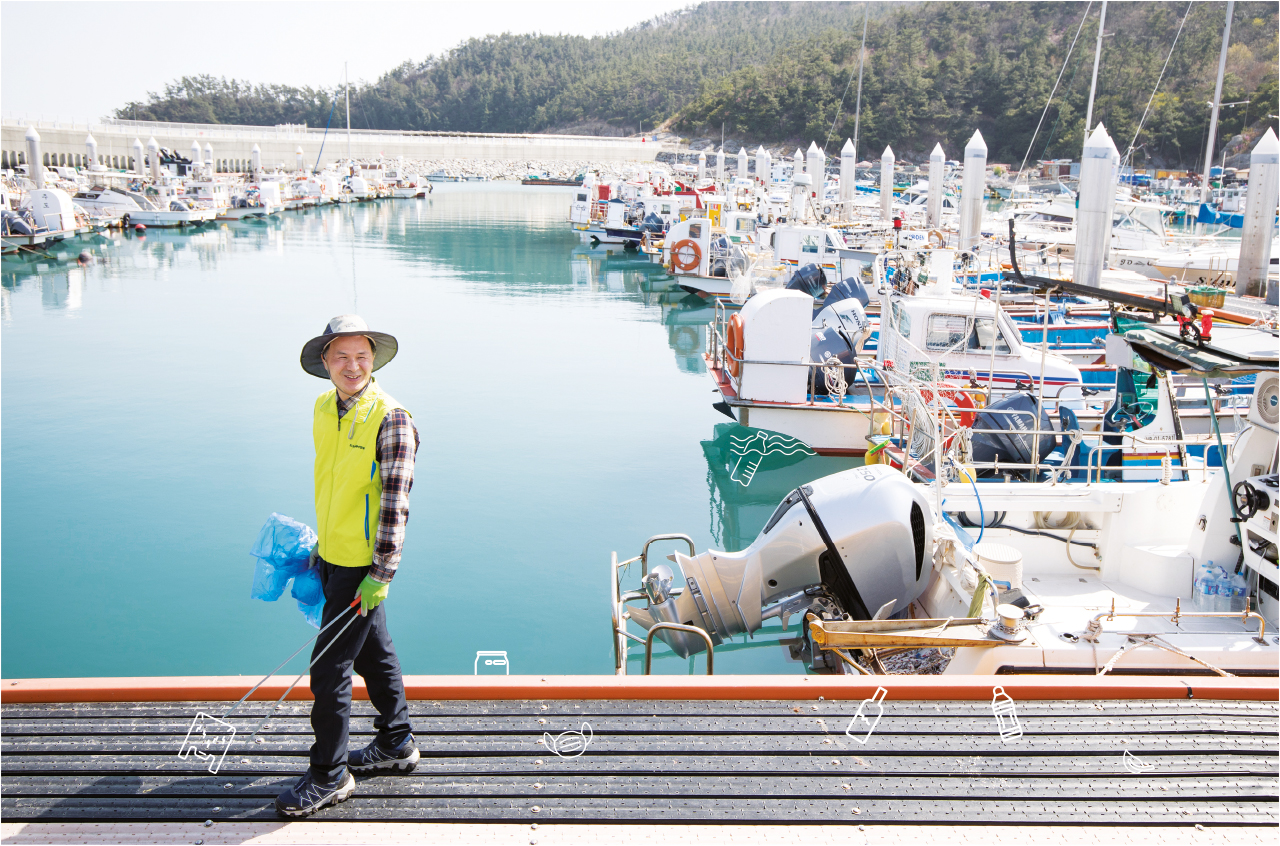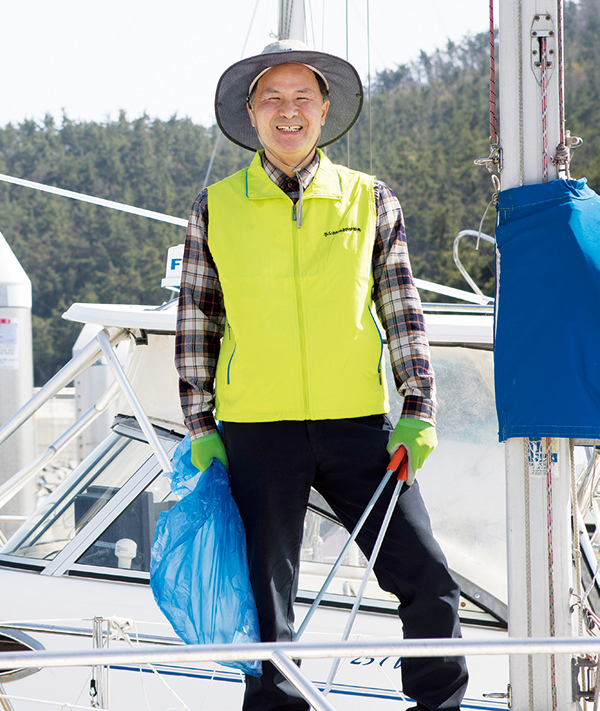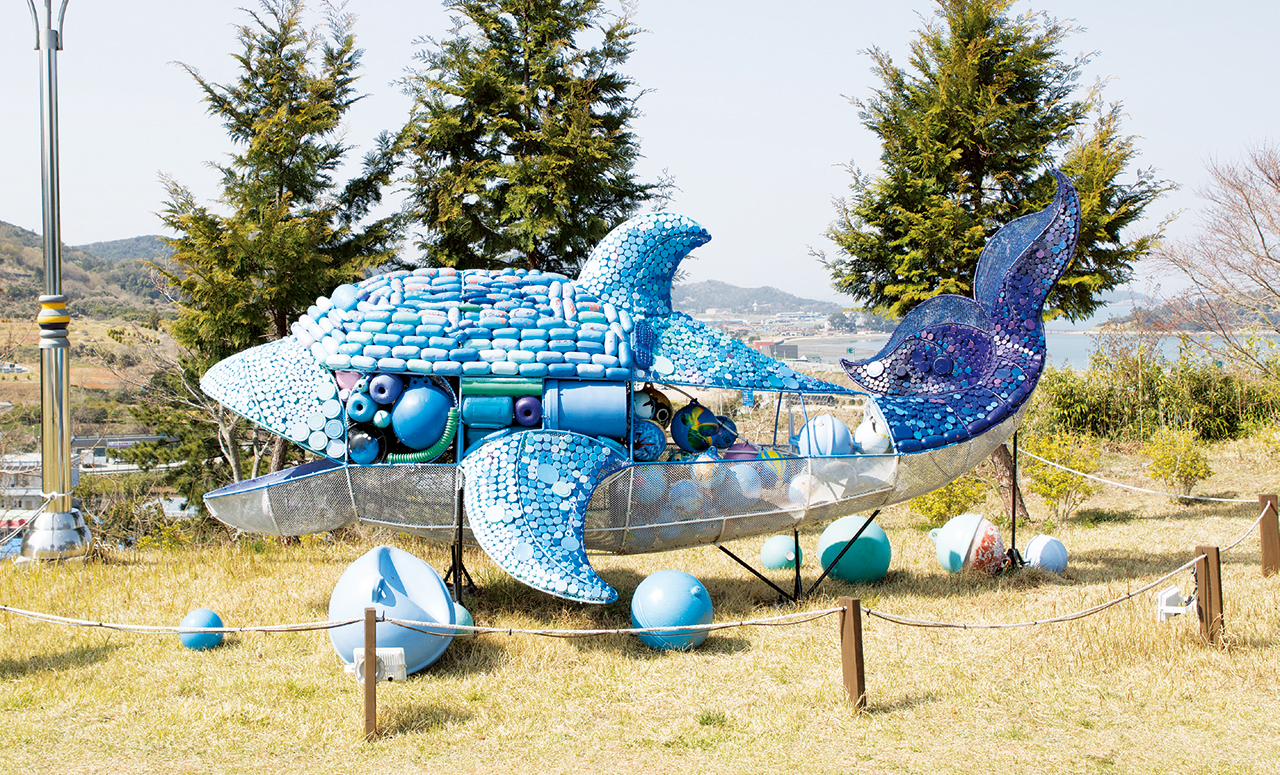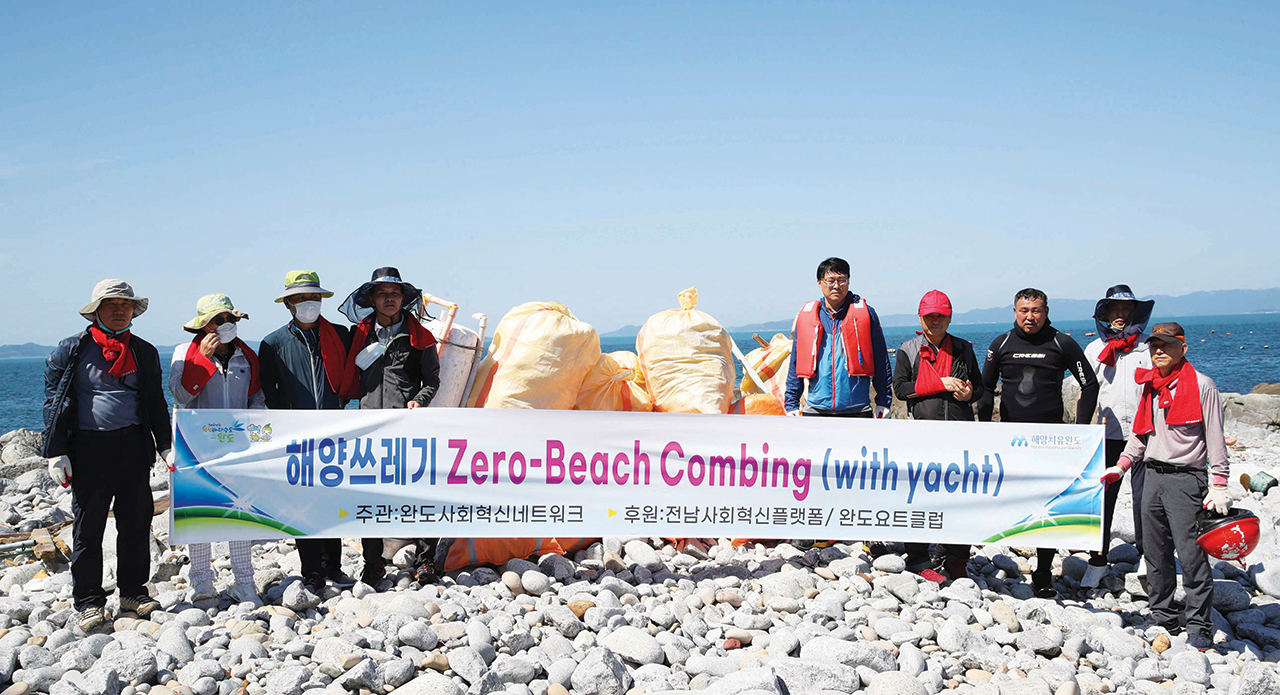
- Water, Nature and Humankind
- Natural Meeting
-
101 ways to preserve the Sea of Wando Island
Gyeong-seok Kim
chairman of the Wando Social
Innovation Network Steering Committee- Written by.Choi Hang-jwa
- Photographed by.Kim Beom-ki
- Since Wando County is made up of 265 big and small islands, stories of Wando inevitably revolve around the sea. Gyeong-seok Kim, chairman of the Wando Social Innovation Network Steering Committee is committed in earnest to protecting the Sea of Wando Island in the hopes that future generations can continue to benefit from the natural treasures that the clean ocean offers to all inhabitants.

Use less plastic, the main culprit of marine pollution
“I knew marine debris is a serious problem, but I wasn’t really interested in environmental issues. It wasn’t until I got involved in the Beach Combing Project organized by the Wando Social Innovation Network (WSIN) that I started to care about marine debris.”
Founded in 2019, WSIN develops policies and projects for local communities, which citizens think are necessary, and offer innovative solutions by implementing them. Concurrently holding the offices as director of the Wando Culture and Art Cooperative and standing director of the Wando County Small Businesses Association, Chairman Kim joined WSIN at the recommendation of his colleague. He readily accepted the offer with the belief that he could play a role in promoting the cause of WSIN. As soon as it was launched, WSIN identified “removing marine debris” as the most urgent task. The campaign was aimed at raising residents’ awareness of how serious marine pollution is and encouraging people to protect a clean ocean for future generations.
“The sea may look clean and free of litter. But if you go out to sea on a boat, you will soon be surprised to see all the debris. There are all sorts of litter including plastic and styrofoam in the water.”
Chairman Kim said he had no idea how many different kinds of debris are dumped into the sea. Used tires, fishing gear, fishing net, plastic bottles, glass bottles and shoes are some of the examples of debris that have been actually removed from the sea by volunteers. It was when Kim saw piles of debris at the shore that he started to get personally and actively involved in tackling environmental issues. Kim said trash thrown mindlessly at the shore may be pushed far into the ocean and a considerable portion of the marine debris is dumped by people who enjoy finishing or other marine leisure activities or those who visit beaches.
Of all marine litter, plastic is the most harmful. Once dumped in the ocean, plastics are broken down into microplastics and nanao plastics which are even smaller, without being decomposed. Microplastics are too small in size even to be removed.
“When we get rid of marine debris, I wish we could rid our mind of mental litter too.”

Marine Debris Transformed into Junk Art
WSIN has been working with citizens who love and want to protect the ocean to carry out marine conservation campaigns. ‘Beach Combing: Litter the Ocean Can’t Handle’ was selected as a social innovation project of Jeolla Province at a contest in 2021. The project included a discussion forum on a boat, the Beach Combing campaign, marine debris collection campaign, marine debris upcycling experience day. Chairman Kim deserves much of the credit for working behind the scenes to make this project possible. He said, “It will take more than one or two campaigns to remove all the marine debris. We need to make sure people can find meaning and have fun as well, while participating in these campaigns, which I think should be carried out over the long term.” Hoping to make the Sea of Wando Island even cleaner, WSIN members are regularly collecting marine debris on Somodo Island and Daemodo Island, islands that no one ever visits, as well as the shores of Wando-eup, Gogeum-meon, and Shinji-myeon. As a result, they collected as much as some 3tons of marine debris last year.
“We put all the marine debris in large bags and carry them on a boat. It is rewarding and satisfying to see a garbage-collection truck come and pick them up.”
This is not the end of the story. WSIN also suggests new ways of tackling marine debris, such as creating artwork by upcycling marine debris. ‘The Dreaming Whale’ installed at Chang Pogo Park is a work of junk art made out of marine debris and plastic bottle caps. The artwork was a product of joint efforts by residents and students. Inside the stomach of the whale is plastic drifted from China, Japan, and marine buoys.

If we pay close attention and stay alert as if we were
cleaning our own yards, I believe we can achieve a goal of
zero marine litter sooner rather than later.


The Next Project: Zero Styrofoam Waste
Through his involvement in WSIN, he learned that becoming aware of environmental issues is the first step in making changes.
He was convinced that anyone can change the way they think and act if they broaden their scope of thinking to include community and future generations as well as themselves, and far more can be achieved when people act together.
Protecting the Sea of Wando Island begins by not dumping waste in it. Damaged buoys installed at sea farms should be removed. You should bring back trash with you when returning from fishing. We need to work together to collect trash from the shores and beaches. All of these require the collective efforts of the entire community.
“If we try harder, conserve more, and voice our concerns, we can keep the ocean clean.”
Kim says he automatically scans for marine debris and checks if there are piles of white buoys whenever he gets on a boat.
Selected once again this year as a social innovation project of Jeolla Province, WSIN is working on a zero styrofoam project, expanding its scope of activities. The zero styrofoam project is intended to use no styrofoam buoys at sea farms in order to keep the ocean clean for future generations. Under the campaign, WSIN will lead earnest efforts to replace styrofoam buoys with eco-friendly ones to protect the marine environment. “If we pay close attention and stay alert as if we were cleaning our own yards, I believe we can achieve a goal of zero marine litter sooner rather than later.”
 ※ This interview was conducted in accordance with the COVID-19 safety rules.
※ This interview was conducted in accordance with the COVID-19 safety rules.

The Wando Social Innovation Network (WSIN)
The Wando Social Innovation Network is an organization that was founded in 2019 to develop innovative solutions to issues of the local community.
It is an innovative platform designed to encourage local residents to get involved in resolving issues of the local community, share their ideas, and ultimately come up with solutions. WSIN has been conducting marine litter collection campaigns to keep local residents and the community informed and aware of how serious marine pollution is, with the ultimate goal of improving the marine environment and encouraging citizens to readily participate.

